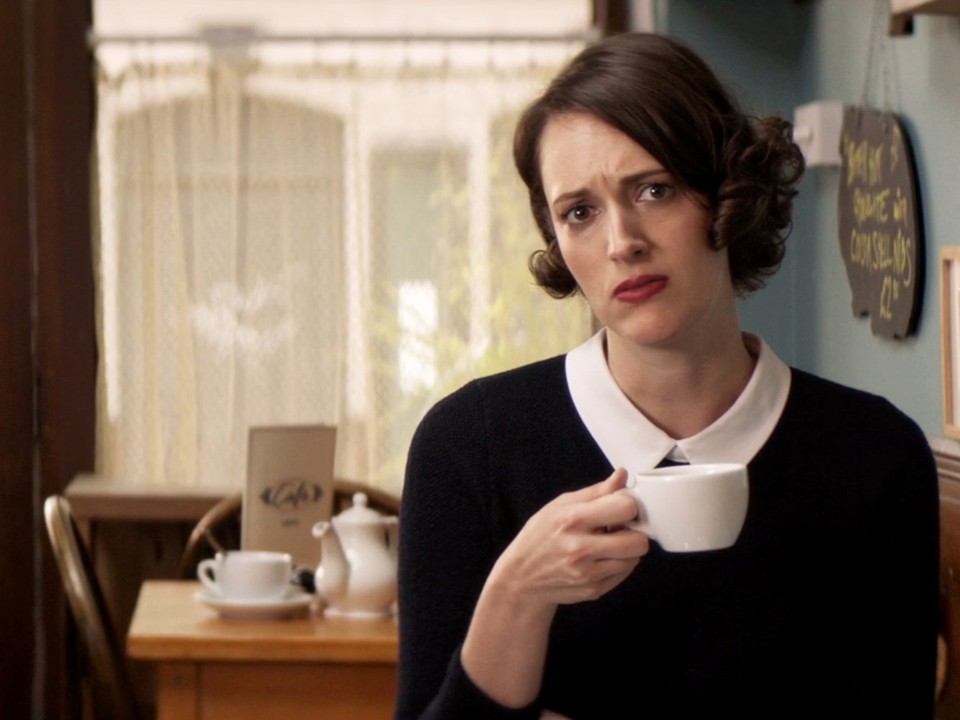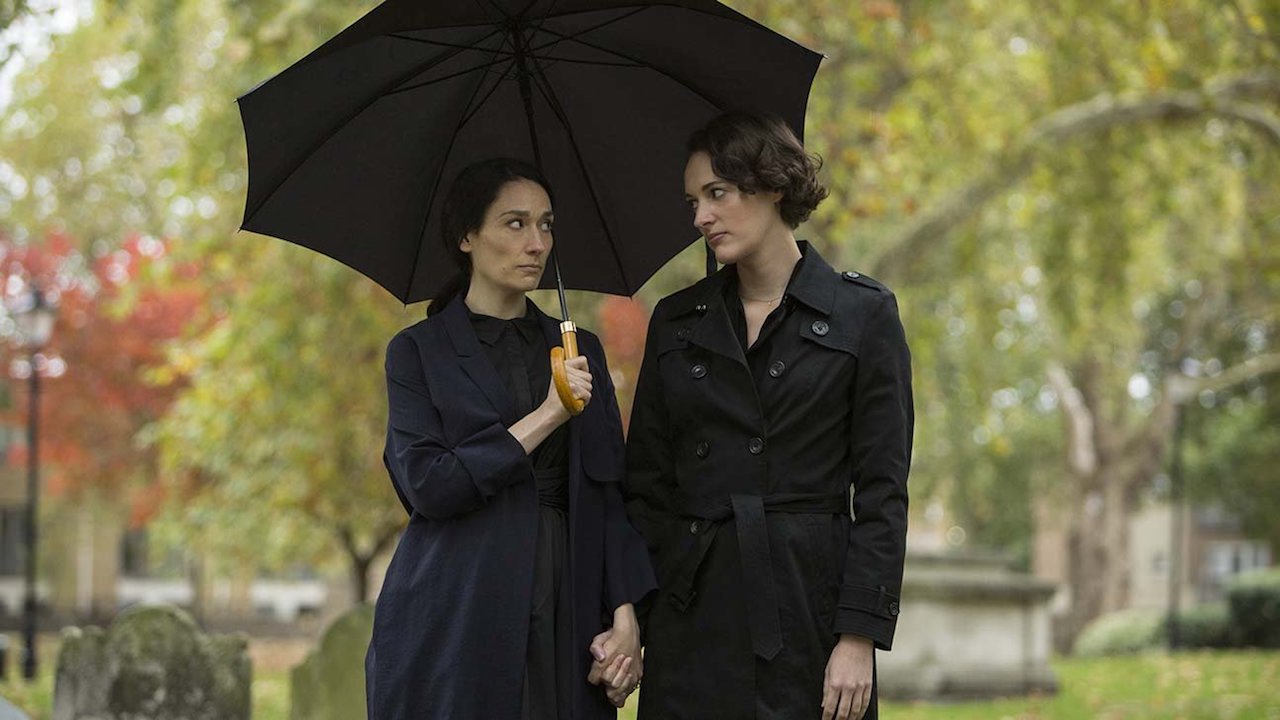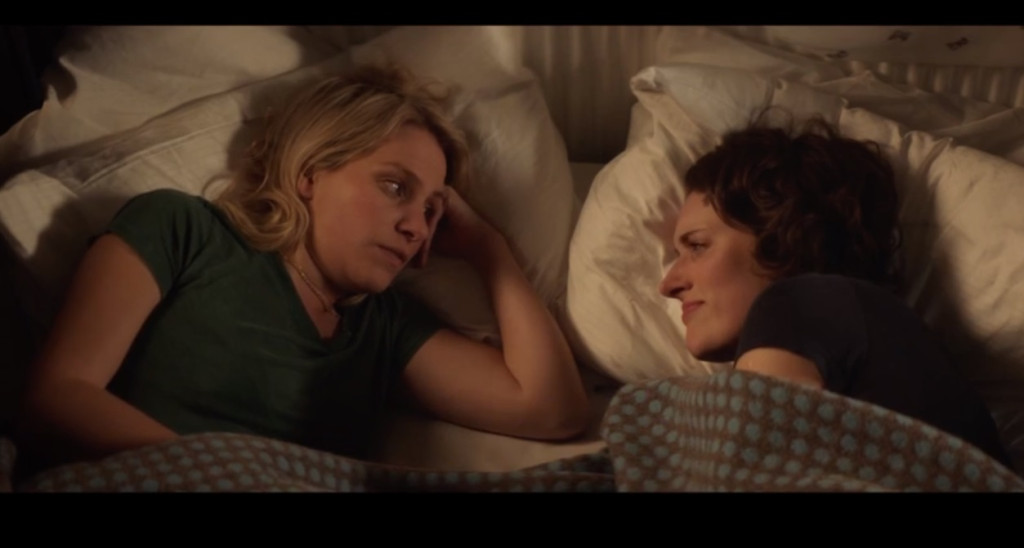The Portrayal of Feminism in Fleabag (2016)
If you had to pick a few traits that significantly set Phoebe Waller-Bridge’s Fleabag apart from other TV programs, you might mention something about its hilariously flawed protagonist, whose name we only ever know as the show’s moniker itself: Fleabag. It is through her eyes that we explore her world as a self-proclaimed sex addict and “bad feminist,” constantly feuding with her perfect sister and stepmother, and reliving the traumatic loss of her best friend and business partner, Boo.
But what were the director’s intentions behind creating this imperfect, loveable character, and what does the show have to say about feminism?

Fleabag: the “Bad Feminist”?
We get a taste of the show’s views right off the bat as the sisters attend a feminist talk and hilariously admit they would elect to lose five years of their lives if it meant having the “perfect” body. Here, Fleabag tells us herself: “I am a bad feminist” (Series 1, Episode 1). Immediately, we are introduced to the mindset of these characters through their flaws, which sets the tone for the rest of the show. Unused to this admission of imperfectness among portrayals of leading women in media, we follow Fleabag’s story with interest as she stumbles through her day to day life, doing things like feuding with her sister and stepmother, and attempting to use her body to get a loan for her failing café. When you put a character like Fleabag next to a female DC superhero, for example, Wonder Woman, one definitely stands out as a more “perfect” depiction of what feminism and female empowerment looks like. But what does feminism look like outside of the curated media environment?
Well, it might look something like Fleabag.
Unlike a lot of other media depicting the “strong female character,” Fleabag gives us the unfiltered story of a woman struggling with real-life issues and real-life insecurities. In another scene much later in the series, we see Fleabag attend a meeting with “The Hot Priest” in which she admits that: “I’m afraid I wouldn’t be such a feminist if I had bigger tits” (Season 2, Episode 2). If there’s one thing we know about feminist teachings, it is that we are supposed to accept our bodies as they are and to stop curating ourselves as objects of the male gaze. But that’s often easier said than done, and many die-hard feminists still struggle with body image and self-worth no matter how much Judith Butler we consume. Here, we get a much needed a taste of the human side of feminism; the relatable and the real struggle of trying to accept ourselves without judgment.

Even Claire, who Fleabag constantly reminds us is the “perfect” sister, struggles with self image and repeatedly references an eating disorder. From her prestigious job to her supposed perfect marriage, Claire represents the life every woman wants. But she, too struggles as we all do, and lapses in judgment when she sides with her lying husband over Fleabag as she is presented with accusations of his act of sexual harassment and infidelity. The scene represents the familiar scenario of the accuser and the accused in a sexual harassment case, and Claire makes the decision to oppose her sister’s claims on the basis of the betrayal of Boo. Here, we feel Fleabag’s distress and her own sense of betrayal as her sister refuses to believe what has happened, mimicking the feeling of what it is like to come forward with a story of sexual assault and to be turned away.
“I have a horrible feeling that I’m a greedy, perverted, selfish, apathetic, cynical, depraved, morally bankrupt, woman who can’t even call herself a feminist.”
Fleabag, Season 1, Episode 1
Seen, but not Heard
Later in the series, the sisters visit a women-only healing retreat in which they are asked to do menial housework in complete silence. At the same time, a retreat designed for men who have harassed women is happening on another part of the property, and Fleabag overhears them screaming vulgar slurs at a blow up doll dressed as a woman. The dichotomy is priceless; while men are permitted to be vocal and expressive, women are told to quiet themselves and dedicate their energies to snipping grass with nail clippers. In the powerful and funny culminating point of the retreat, Fleabag tells Claire a joke while they scrub the floor, and Claire’s sudden burst of laughter turns into sobs which echoes the sentiment of many women whose voices have been silenced.
Hidden in the obvious comedy is the message: women are still often unable to freely express themselves when there is an issue. The pithy scene also pokes fun at the fact that even though the men at the retreat are the ones who have committed an offense, it is still the voice of the female victim that is missing. She is reduced to the silent fate of a crude blow up doll.
The Spirit of Competition
Fleabag’s turbulent relationship with her stepmother is also worth consideration. Here, we see the effects of regarding other women as competition and the passive-aggressive feuding we are conditioned to partake in. During almost every interaction they share, there is something unsaid being communicated between the two women, often unbeknownst to the girls’ father who is an emotionally unreachable fixture in their lives and serves as more of a pawn in their stepmother’s game than as a father. Here, there’s a little play on the “evil stepmother” trope which also adds an almost satirical layer to their relationship. Throughout the series, a headless bust of a woman’s body is passed between the two as Fleabag steals and replaces it, which symbolizes the strained power dynamics between them. It is also ironic that the bust represents the “ideal” woman, and that she is headless, which Fleabag also briefly comments on.

A similar but more subversive dynamic develops between Fleabag and her best friend Boo, as a horrible betrayal on Fleabag’s part indirectly causes Boo’s death. Fleabag’s choice to sleep with Boo’s boyfriend causes a rift in their friendship that never comes to light, but is carried by our protagonist and probably fuels most of her thoughts about being a bad feminist and an overall horrible person. Fleabag’s actions speak to the consequences of betraying the women in our lives in a way that benefits patriarchy–neither women have control in the situation.
The discombobulated music that plays at the beginning of each episode in season one sets the tone very well for the turmoil that occurs within our protagonist as she attempts to root herself in feminist values while also combatting her natural, and often self-destructive tendencies. The show ultimately unveils the more human side of trying to be a better person. And while we are encouraged to do and be better, we are also taught by an imperfect human to forgive ourselves.
What do you think? Leave a comment.











I liked the first couple of episodes of Fleabag then felt it tailed off. I particularly loved the character of Fleabag though – kind of sad how it seemed so fresh and revolutionary in today’s world.
Very clever and outstandingly bold and imaginative Tv Series.
Nice analysis. I was really disappointed she was not the new Doctor Who. As much as Jodie is a great actor, I think Phoebe would convey the Doctor’s eccentricity much more convincingly
The eccentric, naive, clown like stereotype of the Dr is quite boring now as it is so one dimensional. There have been glimpses of a more vulnerable, world weary character previously to Matt Smith, so any progress into showing a more “realistic’ Dr who is not so simplistic is the shake up the series needs.
What do you mean, like a dour Jon Pertwee – that’ll certainly do something to the ratings. The Doctor is not human, so what we see as eccentricity is part and parcel of his/her makeup, because as much as the Doctor is human like, the Doctor is not. Who said anything about a “naive” and “clown like” stereotype – just you.
Loved her in crashing and fleabag, really fresh comedy.
She’s a credit to the profession, she is. Imagine the challenge of being an actual ‘original voice’ in this day and age, when pretty much everything has been done.
She’s a true original, a very rare individual.
Good for her. Good woman!
Wow. I mean, WOW. I’ve gotta check out the series now. I love your exploration of “bad” feminism–because you’re right, since when is it bad for women, even and especially those who call themselves feminists, to struggle with insecurity and other issues? That’s called being human, yes? And the relationship that those human women have to men…complex in itself. Bravo!
A good essay. I enjoyed this TV series, I hope it returns, although I’ve read it might not.
An interesting read! The show seems like it might be worth checking out 🙂
It’s so great to see your article! I really like the point that the feminism in this television series is not “perfect”. On the contrary, in such a world where women still meets the restrictions from patriarchal power and the requirement of being “perfect feminist”, just being oneself is the most important thing.
I’ve haven’t watched Fleabag yet, but I loved your article’s examination of the show. Yes, I think feminism has to incorporate the complexities and imperfections of human nature in general. . . meaning women are not always pillars of strength and fortitude all the time. Not everyone can be Wonder Woman. Not even Wonder Woman herself.
I found her a character in Crashing difficult to digest but watched the whole series, then watched it again, she’s brilliantly honest as an actor and that in itself stops you in your tracks, well me anyway, had no idea she wrote it.
Not caught up with Fleabag yet, look forward to it.
Fleabag was the finest show of last year. Fresh, honest, heartbreaking, did-she-really-say-that? funny. I wish the wonderfully talented Ms Waller-Bridge all the luck in the world with her blossoming career.
Yes she’s a breath of fresh air. Extremely funny and high skilled.
A perfect role model for my daughters, I just need to wait a bit until they’re old enough to watch Fleabag. 🙂
Fleabag for me? It’s her exquisite balance of vulnerable and sledgehammer. How she managed to pull that off through the entire thing I do not know, but I do love it.
Can I just compliment you on your use of “exquisite balance of vulnerable and sledgehammer?”
Would Fleabag be funny if the lead actor had a regional accent? Doubt it. You can get away with anything if you ‘talk posh’.
I don’t think that’s true any more, and hasn’t been for a long time in comedy.
There seems to be a lot of resentment here today.
When I was young and naive I thought one of central goals of feminism was to encourage society to raise the bar on male behaviour, not to lower the bar on female behaviour to the level of drunk, priapic male adolescents.
And apparently you have gotten any smarter since then, eh?
Lena Durham absolutely dominated for a long time but I think Phoebe-Waller-Bridge took over at some point.
Depressing that there’s only room for one woman at a time, right?
She is an extraordinary talent. Fleabag is just brilliant. It helps that she has such a beautiful, mesmeric face. Her expressiveness draws you in, in the same way Meryl Streep does or Bette Davis. There’s a beguiling humanity about her so you find yourself watching her even when she’s not the focus of the scene. That complicit ‘to-camera’ thing might be annoying if a lesser actress did it. And her comic timing is up there with actors like Gervais, Julia Louis-Dreyfus and Larry David. Good luck to her.
I didn’t really ‘get’ ‘Fleabag’, but I could see the sophistication in it, and why other people would love it. What is good for the goose is indeed good for the gander.
I remember seeing her in some third year plays at RADA and thought she was good. I think “Fleabag” is the best comedy series since “The Likely Lads”. It captures the moment magnificently.
I think she is ace.
Fleabag is very funny and achingly honest. Great take on the show.
Fleabag was good. But it was not comedy, it was rather a tragedy showing the false promise of the modern consumerist approach to love and sex.
It was a tragedy, but it wan’t just about sex. Everybody in it is clinging on in desperation.
Comedy drama? But I disagree about the nature of the wonderful Fleabag. A drama that showed “the false promise of the modern consumerist approach to love and sex” would not be a tragedy, but a morality play.
But surely Fleabag was exactly about the consequences, regrets and misery of behaving like a selfish git?
‘Fleabag.’ One of the finest shows in recent years.
Fleabag was astonishing. And utterly brilliant
Here’s a radical thought:
The GREATEST characters in literature & drama — Hamlet, Iago, Raskolnikov (the murderous anti-hero in Dostoyevsky’s CRIME & PUNISHMENT) — are superlatively awesome BECAUSE they invite endless interpretation. They are so multifaceted that they are nearly impossible to pin down.
Well, perhaps for the first time ever in the history of the English-speaking theatre, a FEMALE CHARACTER has broken into that exalted cabal: FLEABAG. She’s so rich: so capable of love yet guilty of betrayal; so vulnerable yet so tough, so funny yet so sad, so dynamic yet so paralyzed. So hyper-sexual… yet (in the 2nd season) practices abstinence. So stuck, while trying so hard to change.
She’s bigger than any unified analysis, because whatever you the critic might conclude, she’s arguably just the opposite, too.
So: is she a feminist or not? The answer is…. BOTH. And THAT is what makes her one of the greatest female characters EVER — because she DEFIES characterization. She’s the ULTIMATE FEMINIST … because she TRANSCENDS labels like “feminist.”
Well, we all transcend the labels we give ourselves to a certain extent because we are human. I would disagree that Fleabag is the “ultimate feminist” as she is meant to represent the audience. The whole point of the show is not to exalt one character, but to show how to forgive ourselves for the pitfalls and hypocrisies of our personalities as humans. Her un-feminist actions are borne of trauma and pain, and we understand her struggle because most of us have felt what she feels. That’s what makes her so powerful.
MM,
well said & food for thought. I dig your comments about forgiveness as a sort of series-long-arc … though I’m not sure that her self-forgiveness is dramatically actualized in that season-2 finale, nor even the intention of the filmmakers.
But to clarify, some characters — in film & TV and even in real life – do NOT transcend their labels. That said, (I would argue) “Fleabag” transcends the label by being so richly feminist while at the same time being so full of contradictions. If being a feminist means (at least in part) living fully as a multi-faceted woman, free from traditional cultural shackles & growth-inhibiting stigmas, Fleabag’s transcendence of the label “feminist” occurs (to me, at least) because (a) she indeed lives her life fully, relishing many aspects of her complicated personality … EVEN WHEN (b) SOME OF THOSE TRAITS ARE POINTEDLY UN-FEMINIST.
Which seems like the ultimate expression of feminism. It’s (very vaguely) akin to the world’s greatest samurai swordsman, who in his greatest battle never actually had to fight. If that makes any sense.
Watching the live performance of Fleabag was a gift in the early pandemic.
i’d never thought of the sculpture as being a representation of the power dynamic but that makes so much sense
This was so great to read. I loved this show, it was so different and consistently entertaining. So much respect that they decided to end it after 2 seasons despite its popularity. It really stuck to the story.
LOVE season two–more than the first. Role of Hot Priest is brilliant.
Phoebe Wallet-Bridge actually appears on the podcast ‘the Guilty Feminist’ and talks about fleabag in depth. The characters’ flaws make her into a stronger feminist representation than any ‘perfect’ feminist icon could be.
fleabag doesn’t use her body to try to get a loan; that’s how the bank manager interprets it.
The greatest show in recent history
For me, the scene where Hot Priest asks ‘what was that? where did you just go?’ to Fleabag will forever be imprinted into my brain.
Love love love Fleabag! This article is beautifully written and such a good analysis on the reality of feminism in the lives of women